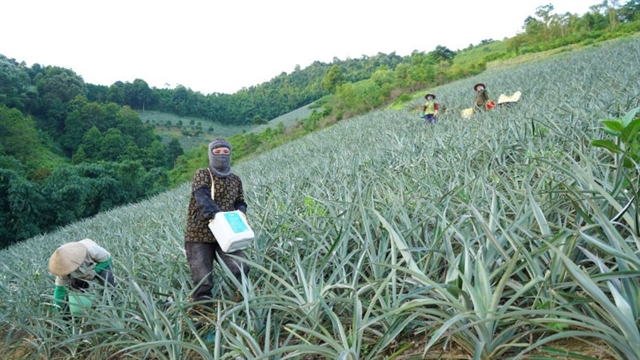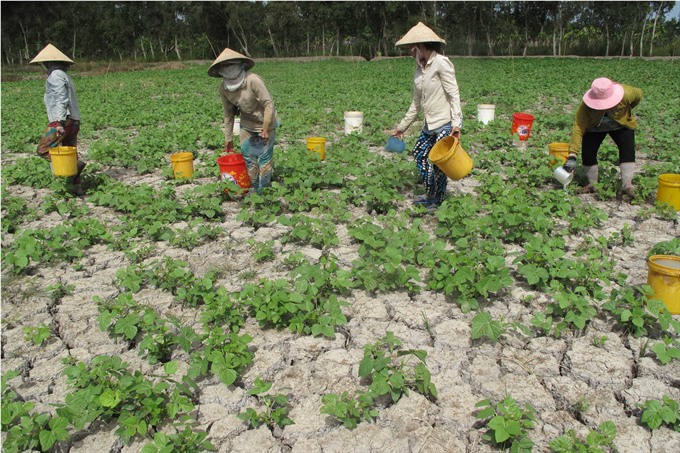 Society
Society

The Vietnamese Government is taking drastic measures in restructuring agricultural production to adapt to climate change, Minister of Agriculture and Rural Development Nguyễn Xuân Cường said yesterday.
 |
| Farmers in Trần Văn Thời District, Cà Mau Province water long bean plants last March as they struggle with drought and salt intrusion. - VNA/VNS Photo Tràng Dương |
HÀ NỘI –The Vietnamese Government is taking drastic measures in restructuring agricultural production to adapt to climate change, Minister of Agriculture and Rural Development Nguyễn Xuân Cường said yesterday.
According to the MARD, as of November, Việt Nam has mobilised US$26.4 million for natural disaster preparedness and climate change impact, of which $18.4 million was from international donors.
“Việt Nam’s agriculture production has been facing several big challenges, of which climate change has brought the most serious and long-term impact,” Cường told the International Support Group (ISG), an annual meeting held by the MARD to exchange experiences and policies on agricultural and rural development with international donors.
“Last year, the country faced several types of weather extremes. The climate change had developed unexpectedly and negatively as compared to the climate change scenario published in 2012,” he said.
The minister said rice planting areas would soon be restructured to adapt to climate change.
According to the United Nations Development Programme (UNDP), the past two years have been exceptionally hard on the rural poor in Việt Nam as they were affected by the strongest drought on record in modern times.
More than two million people suffered water shortages and an increased risk of disease. Some 660,000 hectares of crops were damaged or destroyed and natural resources such as water, soil and forest, were further degraded. Farmers lost valuable income and household debts surged.
The Cửu Long (Mekong) Delta Region, which provides 75 per cent of the country’s total rice output, 50 per cent of the fruit and 80 per cent of aqua-products, suffers the most from climate change and extreme weather.
The Government estimates the demand for recovery from drought and saline intrusion in the 18 severely impacted provinces at nearly $1.1 trillion by 2020, $365 million of which for next year.
However, work on natural disaster preparedness still faces difficulties relating to forecasting and early warning activities, slow financial disbursement, and cumbersome procedures.
To successfully prepare for natural disasters, Việt Nam needs support from the international community to fully evaluate climate change impact and weather extremes on agricultural production, said Nguyễn Văn Tỉnh, deputy director of Irrigation General Department.
“Agriculture, irrigation and coastal protection are key elements for the climate-resilient development of the Mekong Delta”, said German Ambassador Christian Berger.
The country should consider shifting rice production in areas in the coastal zone heavily affected by salt water intrusion for aquaculture, which might be both more suitable to climate change and more profitable for farmers, the Ambassador suggested.
“The prolonged drought has been an eye-opener for Việt Nam and the development community,” said UNDP Việt Nam Country Director, Louise Chamberlain.
“It has pointed out structural issues that need to be addressed in the medium and long-term so as not to endanger sustainable development progress.
“It has shown us clearly that slow-onset disasters deserve more attention through the strengthening of institutions, policies and programmes. And the most vulnerable continue to need our support to deal with this ‘new normal,’” said Chamberlain.
The cost of adaption and climate-proofing might be considerable, but recent experience and research have shown that the cost of not doing it would be much greater, for people, for businesses, and for the state, said the UNDP director. – VNS




